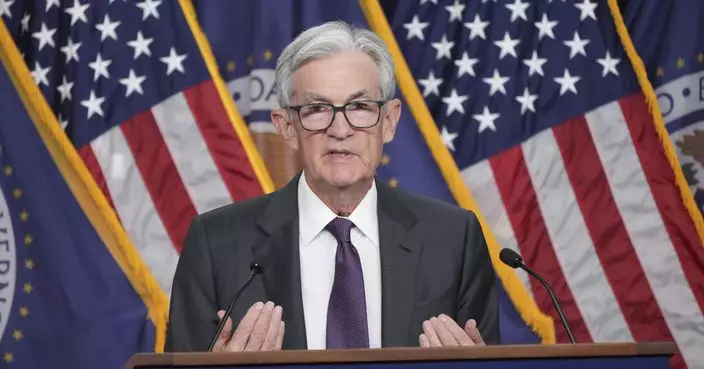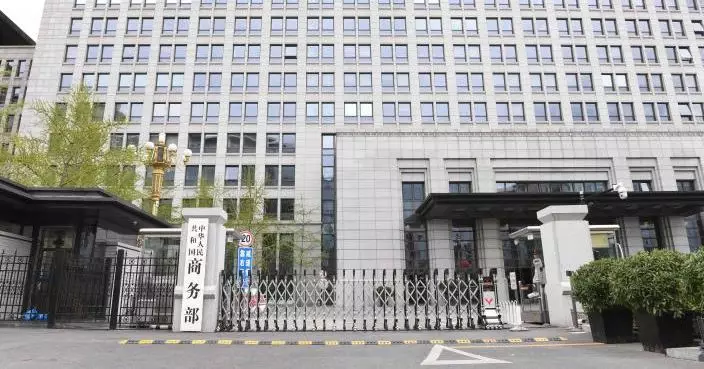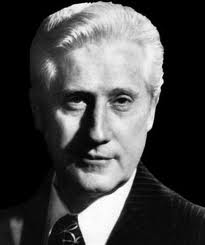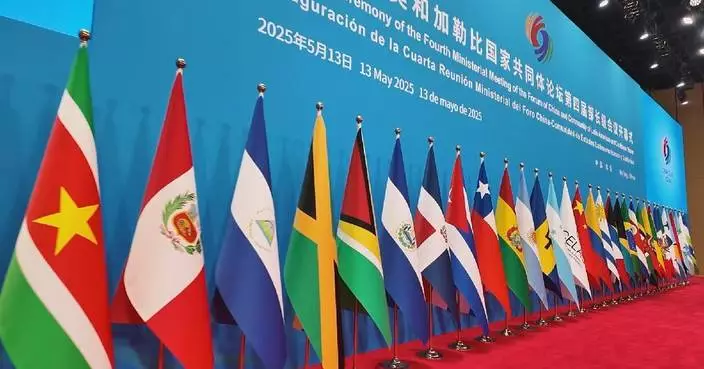President Donald Trump, notorious for his frequent policy reversals—especially on tariffs—has once again changed course, this time regarding the fate of Federal Reserve Chair Jerome Powell. After weeks of escalating attacks and hints at Powell’s removal, Trump now insists he never intended to fire him, accusing the media of spreading falsehoods, although he continues to pressure Powell for more aggressive interest rate cuts. What he said this time sent U.S. stocks soaring. According to American media, Trump’s abrupt change of heart was influenced by the intervention of Treasury Secretary Bessent and Secretary of Commerce Lutnick, while White House lawyers quietly reviewed whether the president could legally dismiss the Fed chair.

Federal Reserve Chair Jerome Powell speaks during a news conference after the Federal Open Market Committee meeting, Wednesday, March 19, 2025, at the Federal Reserve in Washington. (AP Photo/Jacquelyn Martin)
On April 16, Powell said, “Markets are struggling with a lot of uncertainty, and that means volatility.” Given the sweeping changes in President Trump’s tariff regime, his view is that markets are “functioning just about as you would expect them to function”. He further noted that the real issue is the direction of trade policy, and until that’s clear, it’s impossible to make sound assessments, implicitly criticizing the administration’s erratic approach. Unsurprisingly, this triggered a barrage of attacks from Trump.
On April 17, Trump posted on his social platform: “Powell’s actions are always ‘too late and wrong.’ He should have cut rates like the European Central Bank long ago, and now he should cut them immediately. The sooner Powell leaves, the better.”
The next day, during a White House interview, Trump was asked about Powell’s claim that he wouldn’t resign even if the president requested. Trump retorted, “He’ll leave. If I ask him, he’ll leave… I’m not happy with him. If I want him out, he’ll be out there real fast, believe me,” making clear his intent to replace Powell.
Trump’s chief economic adviser, National Economic Council Director Kevin Hassett, later stated the administration would continue to study the issue.
On April 21, Trump again lashed out on social media, “Jerome Powell of the Fed, who is always TOO LATE AND WRONG, yesterday issued a report which was another, and typical, complete ‘mess!’ Trump wrote, “Powell’s termination cannot come fast enough!”, warning that without timely rate cuts, the U.S. economy could slow down. These remarks triggered a sharp selloff, with the Dow plunging nearly 1,000 points.
Yet the very next day, when asked in the Oval Office if he planned to fire Powell, Trump abruptly reversed course, claiming he never intended to do so, though he still urged Powell to take more aggressive action on rates.
What happened behind the scene to prompt this reversal?
According to The Wall Street Journal, before Trump’s public U-turn, Treasury Secretary Scott Bessent and Secretary of Commerce Howard Lutnick intervened. Some senior White House officials had taken Trump’s threats seriously, prompting White House lawyers to privately examine legal options, including whether Powell could be dismissed “for cause”—a standard typically interpreted by courts as requiring misconduct or wrongdoing. Any attempt to oust Powell would have escalated tensions between the White House and the Fed.
Earlier in the week, these discussions ceased after Trump told senior aides he would not try to remove Powell,. Insiders say Bessent and Lutnick warned that firing Powell could trigger severe market turmoil and legal battles. Lutnick also told Trump that removing Powell would likely not change interest rates, as other Fed governors might maintain similar policies.
In fact, as financial markets reacted negatively to Trump’s aggressive trade and economic moves, he was forced to retreat and compromise.
Media analysis suggests that, despite Trump’s indifference to market swings in the eyes of the public, both he and his advisers closely monitor Wall Street and corporate reactions to his policies.
Most analysts believe that even if Trump managed to remove Powell before the end of his term, it would not deliver the lower rates Trump wants. At the last FOMC meeting, all 12 governors supported keeping rates unchanged.
Notably, last month, Trump promoted Fed Governor Michelle Bowman to Vice Chair for Supervision, but Bowman herself has repeatedly warned against premature or excessive rate cuts.
The Fed’s independence has long been regarded as “sacrosanct” by Wall Street bond investors. If foreign investors fear government interference in Fed policy, they could reduce purchases of U.S. debt, driving up rates. Political pressure on the Fed could also lead to short-term policymaking, increasing economic and market volatility.
As the world’s most important central bank, the Fed’s independence is critical not just for the U.S. economy but for global financial stability.
Tim Mahedy, chief economist at Access/Macro, warns that forcing out the Fed chair would trigger a “doomsday” market reaction: “The pain would be swift and severe,” likely forcing the president to backtrack immediately or risk a systemic financial crisis.
Deep Throat
** The blog article is the sole responsibility of the author and does not represent the position of our company. **
A recent trade agreement between the United Kingdom and the United States has sparked concerns that it may serve as a blueprint for Washington to coerce allies into isolating China's supply chains.
On May 8, the UK and the US signed their first so-called "trade and tariff agreement," which includes strict "security" clauses imposed by the US on strategic sectors such as British steel and pharmaceuticals, with underlying calculations targeting China's supply chains. According to a May 13 report in the Financial Times, China responded by emphasizing a "basic principle" that co-operation between countries should not undermine the interests of third parties. The report suggests that these remarks may pose greater challenges for the UK government as it attempts to reset its relationship with China.
According to the Financial Times, the "trade agreement" reached between the US and the UK last week is the first since the Trump administration announced its "reciprocal tariff" plan last month. It involves imposing conditions on the British steel and pharmaceutical industries, requiring the UK to “promptly meet US requirements on the security of supply chains and the nature of ownership of relevant production facilities" in order to qualify for tariff exemptions or reductions from the US.

The UK and the US signed the first so-called "trade and tariff agreement," which includes underlying calculations targeting China's supply chains.
The agreement stipulates that tariff reductions on British goods will depend on "Section 232 investigations," which assess whether and how specific imported products affect US national security. Although the clause ostensibly applies to all third countries, British officials have acknowledged that Trump has indicated China as the intended target.
Former British trade official, Allie Renison, believes that this clause represents a further escalation of the US government's long-term policy of restricting China's involvement in the global supply of strategic goods. Washington hopes that the UK and other countries will disclose critical information, ultimately severing economic ties with China, particularly in sensitive sectors such as steel. Renison suggests that if the UK further aligns its trade policy with the US in exchange for tariff exemptions, China is likely to retaliate in some forms.
Diplomats further point out that the "security clauses" agreed upon by the US and the UK may serve as a "template" for the US to compel other allies to exclude China from critical supply chains, coercing allies like the UK to reduce trade and co-operation with China in sensitive areas.
According to a British government consultant focused on trade, the UK's acceptance of the US "security clauses" has surprised and unsettled China, especially as Prime Minister Keir Starmer's government has been working to improve relations with China. A Chinese source, who requested anonymity, stated that China will need to respond and that the UK should not hastily agree to this agreement.
It's reported that, regarding the sections of the agreement involving China, the British government claims that the trade agreement signed with the US aims to "secure thousands of jobs in key sectors, protect British businesses, and lay the groundwork for greater trade in the future," but also emphasizes that "trade and investment with China remain important to the UK," and that the UK is "continuing to engage pragmatically in areas that are rooted in UK and global interests".
The report notes that China had previously warned countries against signing trade agreements with the US that threaten Chinese interests. A spokesperson for the Chinese Ministry of Commerce stated that China has noticed that some economies are also negotiating with the US, emphasizing that appeasement does not bring peace, and compromise does not earn respect. Adhering to principles and upholding fairness and justice are the correct ways to safeguard one's own interests. Regardless of how the international landscape changes, China will steadfastly expand opening-up, firmly safeguard the multilateral trading system with the World Trade Organization at its core, and unswervingly share development opportunities with countries around the world. China is willing to work with all parties to continuously deepen mutually beneficial co-operation, strengthen communication and co-ordination, jointly resist unilateral protectionism and hegemonic bullying, and jointly maintain free trade and multilateralism, promoting inclusive economic globalization.
Guancha (The Observer Net) cited Zhang Yansheng, a senior researcher at the Chinese Academy of Macroeconomics, who stated that Washington will clearly force other countries to accept similar clauses in trade negotiations to isolate China, and that the UK's move is unfair to China. "This poison pill clause is actually worse than the tariffs."
However, Zhang Yansheng believes that China should not immediately take retaliatory actions but should directly raise this issue in dialogues with the UK. He argues that the fundamental problem lies with the US, while other countries are only secondary actors, and that the issue should be discussed in trade talks with the US.
From May 10 to 11, senior Chinese and US economic and trade officials held talks in Geneva, Switzerland, where both parties agreed to reduce tariffs by 115% within 90 days, and issued a joint statement on the outcomes of the meeting.

On May 12, the Ministry of Commerce stated that the equal dialogue and consultation between China and the US to resolve differences is an important step.
On May 12, a spokesperson for the Ministry of Commerce stated that the equal dialogue and talks between China and the US to resolve differences is an important step towards further bridging divides and deepening co-operation, laying the foundation and creating conditions for further progress. The two sides reached several positive consensus points in the joint statement, recognizing the importance of bilateral economic and trade relations to both countries and the global economy, as well as the importance of sustainable, long-term, and mutually beneficial bilateral economic and trade relations. Both sides will continue to advance relevant work in the spirit of mutual openness, continuous communication, co-operation, and mutual respect.
The spokesperson added that both sides have agreed to establish a China-US economic and trade consultation mechanism to maintain close communication on their respective concerns in the economic and trade fields and to conduct further consultations. The Chinese representative is Vice Premier of the State Council, He Lifeng, and the US representatives are Treasury Secretary, Scott Bessent and Trade Representative, Jamieson Greer. The two sides will conduct consultations regularly or irregularly in China, the United States, or in agreed-upon third countries. As needed, the two sides may conduct working-level consultations on relevant economic and trade issues.





















































